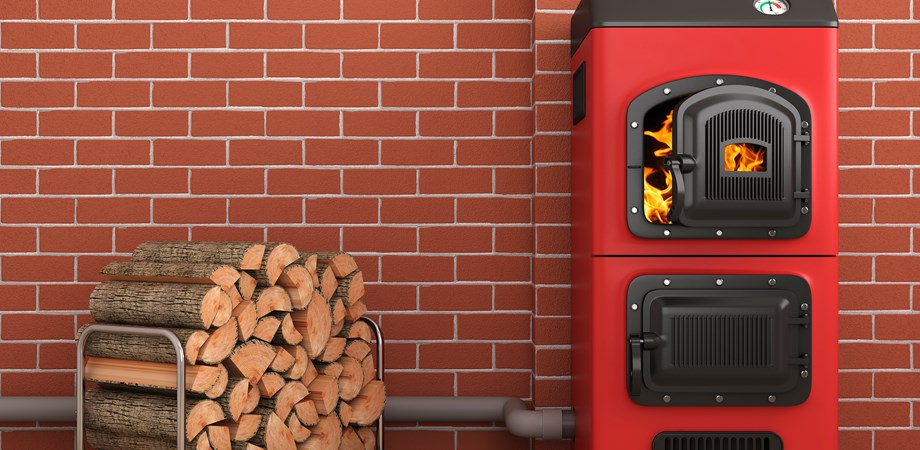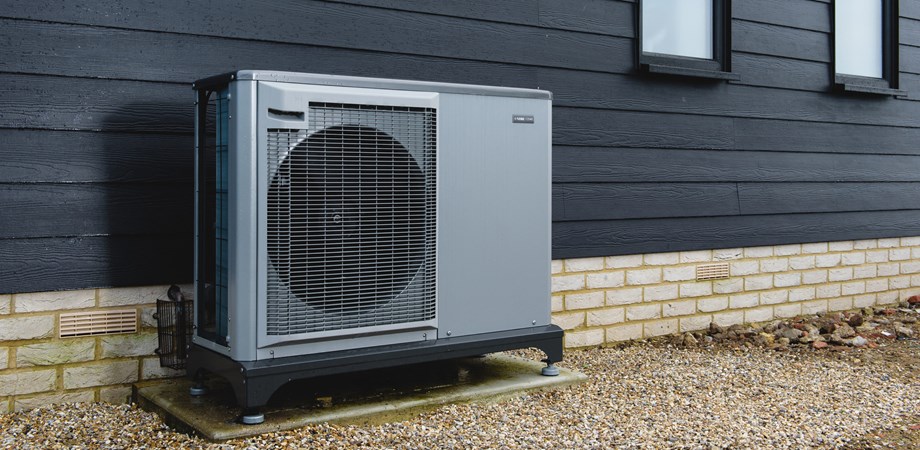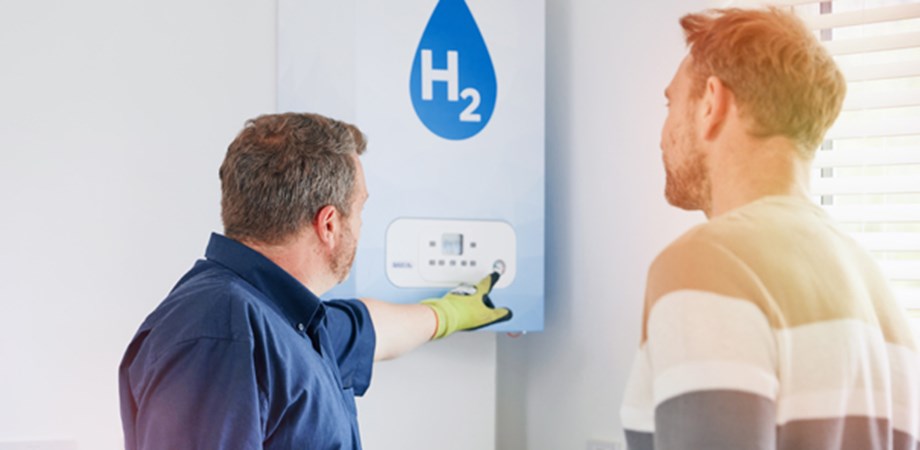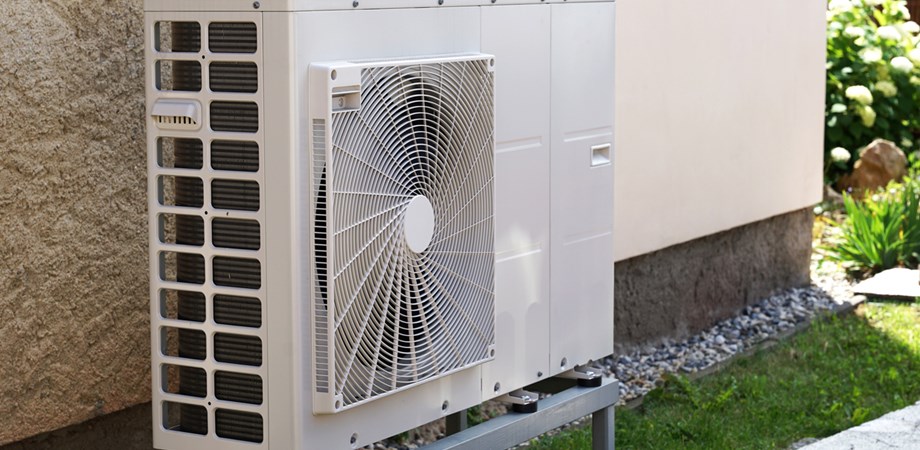Any new plans for new buildings seeking Building Control authority approval will need to feature greener, low carbon heating systems
Please be advised that, due to legislative changes, Building Control authorities will reject new applications for a new building, that include the installation of a fossil fuel heating system. This came into effect on 1 January 2024.
This change applies to new builds and the term ‘new building’ includes extensions. You will be affected if you plan to install a fossil fuel boiler, oil tank or gas supply in a new extension. You can proceed to connect an extension to a fossil fuel heating system in the existing part of the building by the installation of new pipework and radiators.
Please note, a ban on installing fossil fuel systems in new buildings follows in 2025, therefore if you already have Building Regulation approval it must be installed prior to 1 January 2025.
Unsure how the legislative changes in relation to fossil fuel heating systems will affect your build or your development? Use this flow chart to find out…
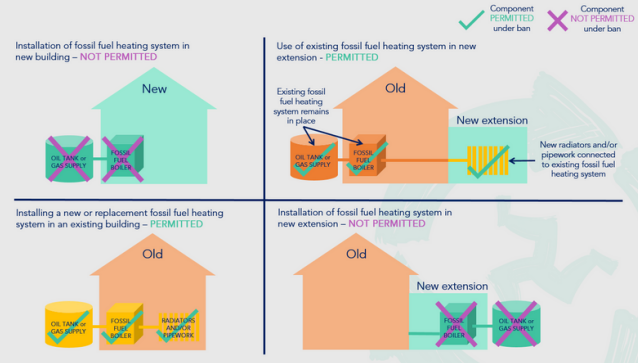
BACKGROUND
Heating of our building stock is one of the greatest contributors to greenhouse gas emissions on the island. The residential sector in 2022 contributes the second-largest proportion of emissions on the Isle of Man, accounting for roughly 25% of the Island’s total annual emissions. If we are to reach net-zero by 2050 it will be vital for us to decarbonise our buildings, and new homes and buildings will lead the way in this transition.
From 1 January 2025, the Climate Change Act 2021 makes it illegal to install fossil fuel heating systems into new buildings. The Act was consulted on in 2019 with strong support for this initiative (view the results).
A consultation ending in May 2023, resulted in amendments commencing 1 January 2024 for Building Control authorities to reject new applications for new buildings containing fossil fuel heating systems.
Gas and oil are fossil fuels, which we know we will need to move away from to limit rising global temperatures. New build properties are easier and cheaper to decarbonise than older buildings, which need to be retrofitted to accommodate low carbon heating systems and require other fabric upgrades to make those systems work efficiently.
Ban on fossil fuel heating systems in new buildings from 1 January 2025
From 1st January 2025 it will be illegal to install a fossil fuel heating system in a new building.
This will apply to:
- new domestic and non-domestic buildings.
- new buildings, as defined in building control legislation. This means that the ban will apply where the system is to be installed in a new extension.
This will not apply to:
- installation of new or replacement fossil fuel heating systems in existing buildings.
- the use of an existing fossil fuel heating system in a new extension by the installation of pipework and/or radiators connecting a new extension to an existing fossil fuel heating system.
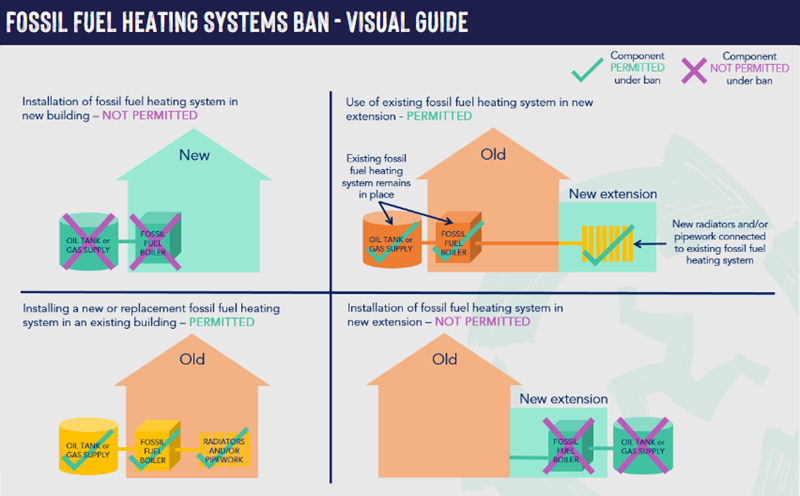
This change is a result of section 28 of the Climate Change Act 2021, which states that: a person who installs a fossil fuel heating system on or after 1 January 2025 —
(a) in a new building; or
(b) for use in a new building, commits an offence.
Maximum penalty —
(summary) — a fine of level 5 on the standard scale;
(on information) — a fine.
This change in the law in relation to new buildings, may affect whether existing Planning and/or Building Control approvals can be implemented and not be in contravention of the Climate Change Act. If you have Building Regulation approval and are due to commence or carry out the work on installation of a fossil fuel boiler in a new building, you must have completed the installation before 1st January 2025.
Following that date, you will not be able to install it. You will need be required to re-apply for planning approval for that development or make an amendment to your building control application to accommodate an alternative form of heating.
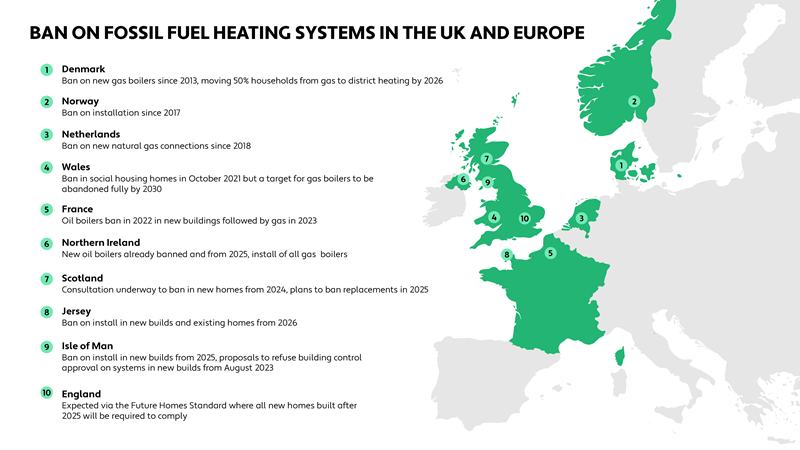
The Consultation
The Climate Change Plan 2022-2027 contained an action to bring forward the fossil fuel heating systems ban in new builds from 2025 to 2024, an action supporting the reduction of emission targets over the next five years and beyond.
A consultation took place from 17 March to 12 May 2023 to seek views on proposals to refuse Building Control approval on applications for new buildings containing a fossil fuel heating systems from 1 August 2023.
In response to the results of the consultation and a programme of engagement activities with relevant industries, the Council of Ministers have decided not to bring the date forward and to proceed as already set out in the Climate Change Act.
In December, Tynwald agreed to enable Building Control authorities on the Isle of Man to reject new applications for new buildings containing polluting fossil fuel heating systems, from 1 January 2024.
This provides a year transition period before the ban on installing them in new builds comes into effect on 1 January 2025.
REGULATIONS THAT COMMENCED 1 JANUARY 2024: New Buildings and Extensions
Plans for a new building submitted to Building Control from 1 January 2024 that contain fossil fuel heating systems will be rejected.
This will apply to plans submitted for:
- new domestic and non-domestic buildings
- new buildings, as defined in building control legislation. This means that the plans will be refused whereby the system is to be installed in a new extension.
This will not apply to plans submitted for:
- fossil fuel heating systems in existing buildings.
- the use of an existing fossil fuel heating system in a new extension or to the installation of pipework or radiators in a new extension.
GTEC Isle of Man
GTEC is the UK's #1 Renewable Energy Training Provider, with over 15 years’ experience upskilling trades people to take advantage of the opportunities presented by low carbon heat and power.
GTEC's training is provided on-Island and dedicated to advancing skills in renewable energy and sustainable technologies.
Starting with a focus on Solar PV & Battery Storage courses and then Air Sourced Heat Pumps, our Isle of Man centre is set to establish itself as a prominent hub in the field of green energy training.
GTEC delivers industry-recognised qualifications from Awarding Organisations LCL Awards, City & Guilds and OFTEC, covering renewables and supporting electrical, plumbing and oil qualifications.
Visit their website to learn more about upcoming courses and dates.

FAQs
Oil and gas boilers are fossil fuel heating systems. This includes oil and gas storage and supply components such as oil tanks, gas tanks and mains gas connections.
Part of the consultation requested feedback to define what is – and is not – a fossil fuel heating system. This now defines what systems are prohibited by the upcoming 2025 ban and which applications will now be rejected Building Control.
The following is the resulting definition of a ‘fossil fuel heating system’ as a result of consultation, and now set out in regulations.
IS a fossil fuel heating system (ie. NOT permitted in plans seeking Buildings Regulation approval from 1 Jan 2024, and NOT to be installed in a new building from 1 Jan 2025)
-
New or pre-used boilers capable of providing heat and/or hot water through the combustion of fossil fuels (other than for high temperature applications for commercial or industrial purposes).
NOTE: This includes fossil fuel heating systems that could use low carbon fuels, such a hydrogen ready gas boilers or oil boilers that could use biofuels. At present, neither hydrogen nor biofuels are available for building heating on the Isle of Man.
Allowing the continued installation of such heating systems would mean allowing the continued use of natural gas and oil to heat buildings, until low carbon alternatives become available. Once the future of hydrogen and biofuels for home heating becomes clearer, these provisions could be revisited.
-
Supply and storage components of fossil fuel heating systems (eg. oil tank, gas supply), whether or not the boiler component is also installed.
NOTE: These parts of a heating system, although they do not themselves burn fossil fuels, are included within the ban to discourage retrofitting with fossil fuel heating systems.
- Oil or gas fired appliances that can also be used for cooking, if they are connected apparatus that supplies heat or hot water.
IS NOT a fossil fuel heating system (ie. permitted)
- Any low emissions heating system, including:
air or ground source heat pumps;
heat networks (where the heat source is not powered by fossil fuels);
solar thermal and solar thermal storage systems;
electric storage heaters;
electric boilers;
fuel cells; and
direct electric heaters (including electric panel heaters, electric fan heaters, thermal fluid-filled radiators, and electric radiant heaters). - Systems designed for high temperature applications for commercial or industrial purposes.
- Freestanding heating appliances (e.g. electric oil filled radiators, gas heaters that house a small bottle of gas)
- Components of heating systems that do not themselves burn fossil fuels e.g. internal pipework, radiators, valves (with the exception of supply and storage components).
- Open fires and multi-fuel/wood burning stoves, whether or not connected to apparatus that supplies heat or hot water. This includes AGAs and similar appliances that do not use oil or gas.
- Biomass boilers (ie. boilers that use renewable biomass fuels such a woodchips)
From 1 January 2024 Building Control Authorities will stop approving plans for new buildings containing fossil fuel heating systems, and from 2025 fossil fuel heating systems will not be permitted to be installed. New homes and buildings on the Isle of Man will be designed to be heated differently.
Those who buy new homes will be reassured that their home is future-proofed against the need to have to switch heating systems or retrofit in the future.
Alternative heating systems already in use are;
- air source heat pumps or ground source heat pumps;
- solar thermal and solar thermal storage systems;
- electric storage heaters;
- electric boilers;
- fuel cells; and
- direct electric heaters (including electric panel heaters, electric fan heaters, thermal fluid-filled radiators, and electric radiant heaters).
You should ask your architect or builder which option is best for your property.
There is currently no requirement for homes that we currently live in or existing buildings undergoing refurbishment to replace their fossil fuel heating system. If however, your system is coming to the end of its life, we would recommend considering a low carbon heating system.
The following grants are available to make existing homes more energy efficient;
The Energy Efficiency Scheme provides simple but effective energy efficiency measures free to eligible households.
The Green Living Grant Scheme provides up to £6,000 in financial assistance offered in the form of a Manx Home Energy Audits (MHEA) alongside a Green Living Grant, which provides 50% matched grant support towards approved works assisting Island residents with the reduction of carbon emissions and household energy bills.
No they will not be allowed to be installed in a new building as hydrogen is not currently available for home heating on the Island and appears unlikely to be in the foreseeable future. As hydrogen ready boilers can burn natural gas, they are prohibited by the ban. If hydrogen for home heating becomes available in the future, an exception could be reconsidered.
However, the availability of hydrogen fuel at a competitive price seems unlikely. Consumers need to be aware that a home fitted today with a ‘hydrogen-ready’ boiler will likely only natural gas during its useable lifetime, and it is probably it will need to be replaced well before hydrogen starts to become readily and cheaply available.
Find out more about the role of hydrogen in home heating.
Biofuels are not currently available for home heating on the Island. As biofuel ready boilers can burn fossil fuel oil, they are prohibited by the ban. If biofuels for home heating becomes available in the future, an exception could be reconsidered.
AGAs or similar appliances that run on coal and wood are permitted as they are 'multi fuel boilers'. However, AGAs or similar appliances that run on oil or gas and are connected to radiators or water heaters are not permitted.
The term ‘new building’ in Building Control legislation includes extensions.
The ban only applies if the boiler (or the oil or gas supply or storage components e.g. tank, mains connection) are being installed in the new extension. This also applies if you are installing a new or moving an existing fossil fuel heating system to the new part of the building such as a new utility or garage. Connecting a new extension to a fossil fuel heating system in an existing building is allowed.
If you are building a new extension and are planning to install a low carbon heating system such as an air source heat pump, homeowners will need be mindful that they have the appropriate energy efficiency measures in place in the existing building to make sure these systems run effectively.
The efficiency of low carbon heating systems such as ASHPs means that emissions will still fall by comparison to installing a fossil fuel system, even though electricity is currently generated by gas. Furthermore, Manx Utilities’ Transition Programme will include at least 20MW of renewables by 2026, additional renewables between 2026 and having carbon neutral electricity from 2030.
